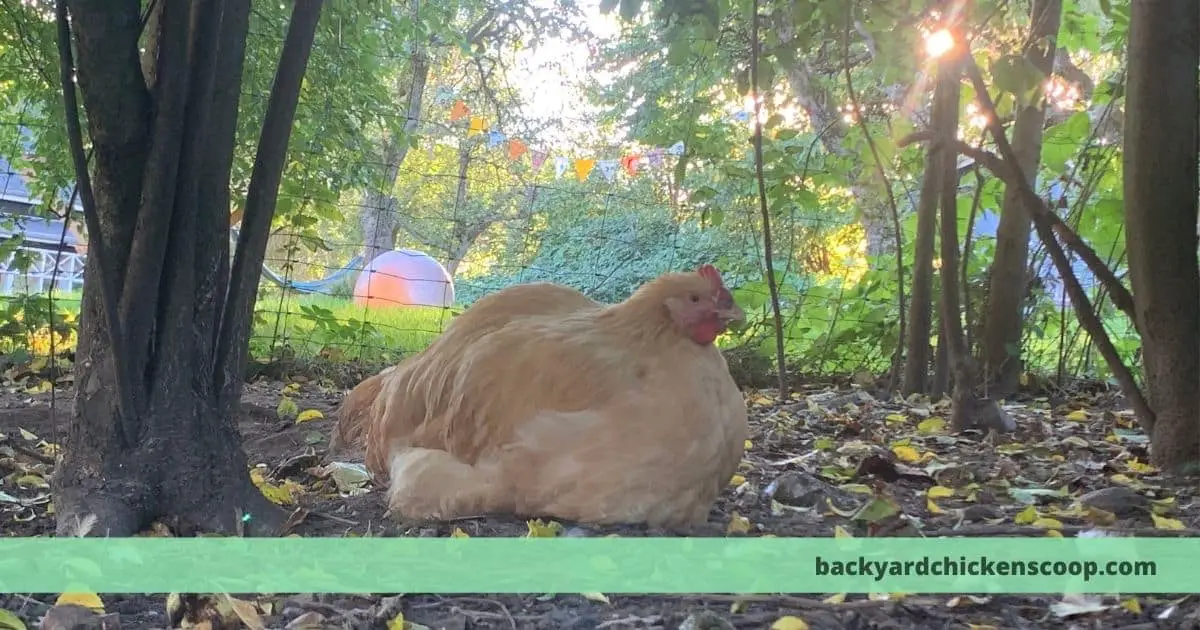As a vet, I feel this is one of the most important topics. Signs of pain in chickens are subtle and can easily be overlooked. So, let’s dive in what are the sign of pain in chickens?
Chickens feel pain as other birds do. Chickens might not have as rich an emotional life as some mammals, but the nerve receptor and the sense of pain are very real. The signs of pain in chickens include a disinterest in eating, vocalising or complete lack of vocalising, limping, or squawking excessively.
What can cause problems and stress for chickens
As you may already know or will find out when your chickens reach egg-laying maturity, there are a variety of problems [source] you may encounter while raising your chickens as well as stressors that can affect your chicken’s health.
Potential stressors can include the following:
- Predators
- Chemicals present in the environment (pesticides, herbicides, insecticides, etc.)
- Nutritionally-deficient feed
- Disease/infection/injury
- Competition from other chickens
- The weather (particularly if it is hot and there is inadequate water)
- Excessive movement or transportation.
These stressors can manifest into a variety of different problems [source], including pecking or feather removal, attempts to fly away or a loss of appetite, but will almost always result in a loss of egg production.
How to tell if a chicken is in pain
Unfortunately, chickens can’t verbally express their concerns, but there are other ways of identifying when your chicken is experiencing problems and what the potential source of pain may be.
Given the potential sources of problems for your chicken, understanding the various signs [source] when your chicken is in pain is critical to being able to quickly remedy the situation.
If your chicken has dull feathers or bald patches, it could be a sign of poor nutrition or competition from other hens, which may require different feed or more space for the chickens.
If your chicken is disinterested in eating, this could be a sign of injury or infection. Make sure the chickens have clean food and water free from debris, particularly rodent faecal matter; if your chicken feels underweight, bringing your chicken to a vet may be able to identify the problem further.
If a chicken has a cough or a dirty back end, checking to ensure that the ventilation, roosting and bedding is adequate and clean in your coop will help to prevent parasites and any other pathogens that might affect your chickens.
Lastly, if you see your chicken limping or squawking excessively, this could be the sign of some sort of a nuisance or predator that you would need to deter while moving your chicken to a safer space.
How to treat your chicken when it’s in pain
If your chicken experiences any pain or injury, there are a variety of measures [source] that you can take that can help to solve the problem and prevent a trip to the vet or minimize further damage until you seek further consultation.
It’s always good to have a chicken first-aid kit assembled in the event that anything happens to your chicken.
A first aid kit for chickens can include antibiotic ointment for any scrapes or cuts, clippers to keep beaks and nails in line, gauze, electrolytes for expedited rehydration, bandages and styptic powder to control bleeding.
Can you take a chicken to the vet?
Not all veterinarians will have the skill to diagnose and treat chickens or any other bird for that matter. But if your chickens are in pain you not only CAN take her to the vet, you SHOULD.
Chickens can be seen by a vet like any other animal. Some poultry vets do house/farm calls so you don’t have to move your flock. In some areas, the sick chicken should be brought to the vets clinic. You should always phone them beforehand, to check if they have a bird knowledgable vet on staff.
Injury and dehydration
If you notice that your chicken is suffering from dehydration, a quick fix is to move your chicken to a cooler area and provide adequate water. It’s always a good idea, in case of illness or injury, to have an area to isolate your chicken as well as to support it during its recovery.
When isolated, it can help to calm your chicken, thus reducing the possibility of further injury or damage, while allowing you the opportunity to assess your chicken’s situation. It’s always a good idea, especially if there’s an internal injury or the potential for a parasitic infection, to contact your veterinarian so that your chicken can receive proper care to prevent further injury to itself as well as to the rest of your flock.
Many people don’t appreciate the intricacies and wonders of raising chickens. Given the nuances of egg-laying alone, it’s an incredible process that transforms a yolk into an egg. As amazing as this process is, your chickens are still living creatures susceptible to a variety of stressors, ailments and problems.
Fortunately, many of these problems can be prevented or at least quickly addressed. We hope that you have a better understanding of the egg-laying process as well as how to help your chicken when it’s in pain. Once you can answer the question “how do I know if my chicken is in pain?”, you can help your chicken live the life it was meant to live!


